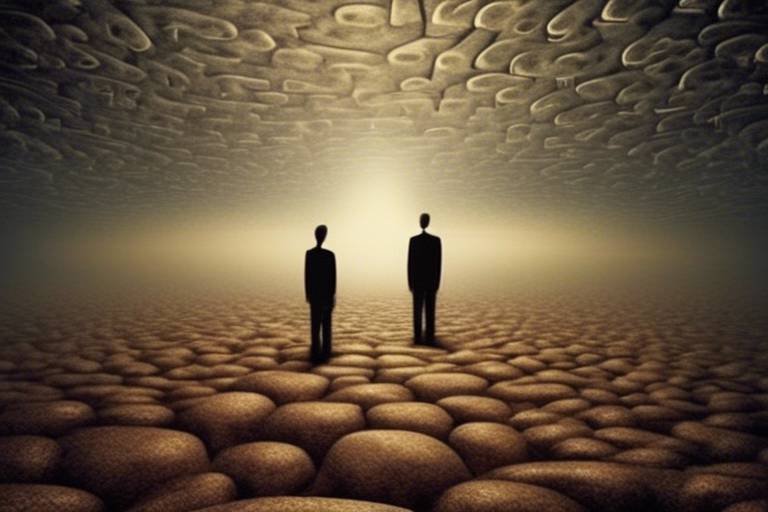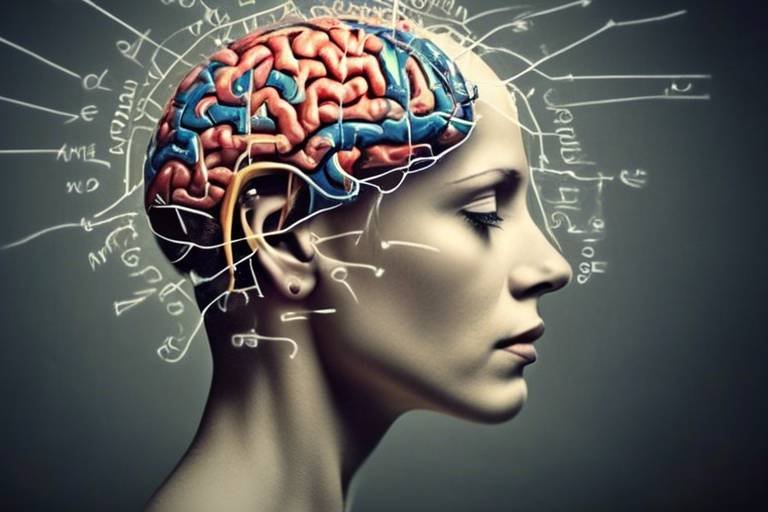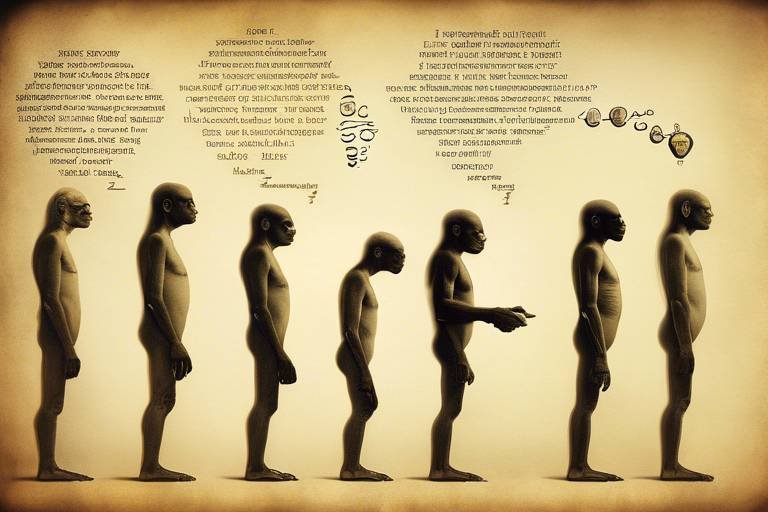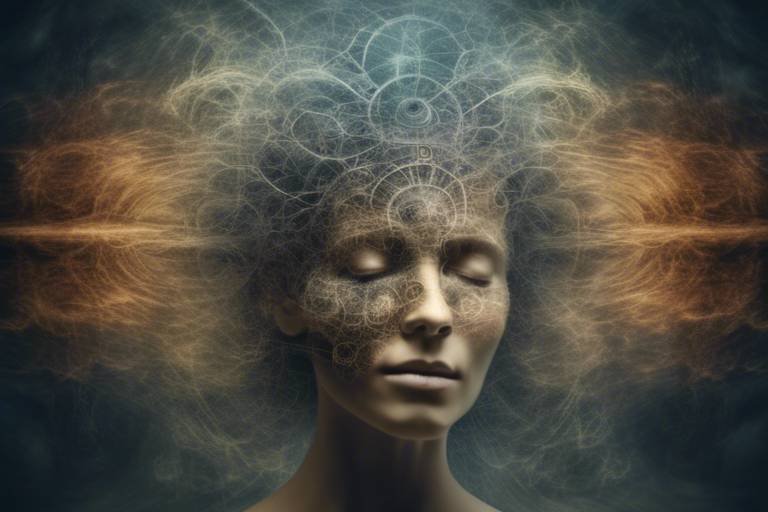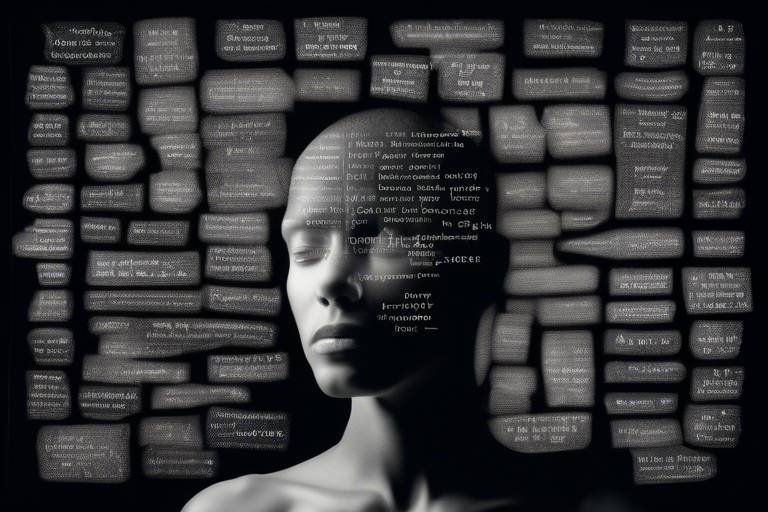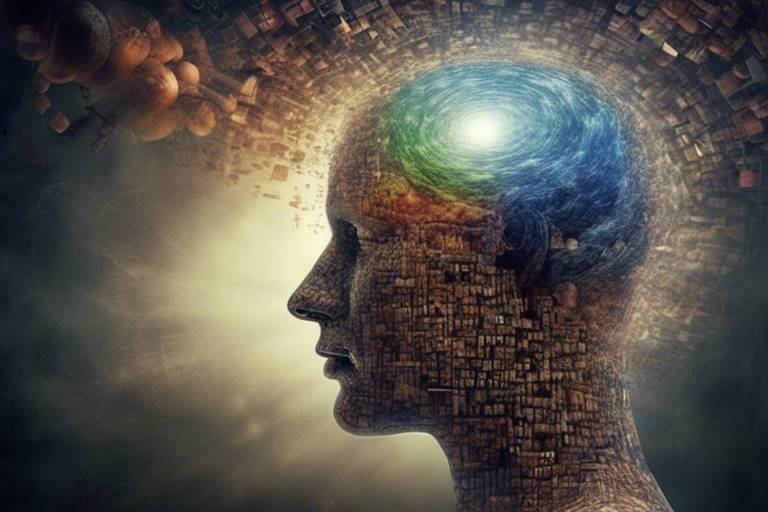Does Quantum Theory Explain Consciousness?
The relationship between quantum theory and consciousness is one of the most captivating and perplexing topics in contemporary science and philosophy. Imagine trying to solve a puzzle where the pieces are constantly changing shape—that's what exploring this connection feels like. Quantum theory, with its strange and counterintuitive principles, challenges our traditional understanding of reality, while consciousness remains one of the greatest mysteries of human existence. Can these two realms intersect? Are our thoughts and experiences governed by the same rules that dictate the behavior of particles at the quantum level? In this article, we will dive deep into these questions, unraveling the intricate threads that weave quantum mechanics and consciousness together.
At its core, quantum theory introduces concepts such as superposition and entanglement, which seem to defy our everyday experiences. Superposition suggests that particles can exist in multiple states simultaneously until observed, much like how our thoughts can drift between various ideas before settling on one. Entanglement, on the other hand, implies that particles can be interconnected in such a way that the state of one instantly influences another, regardless of distance. This idea raises fascinating questions about the interconnectedness of consciousness. Could our minds be entangled with the universe in ways we have yet to understand?
As we explore the nature of consciousness, we must ask: what does it mean to be conscious? Is it merely a byproduct of brain activity, or is there something more profound at play? Various definitions and theories attempt to encapsulate consciousness, from the simple awareness of our surroundings to the complex tapestry of thoughts, emotions, and self-reflection. Philosophers have long debated these ideas, offering perspectives that range from dualism, which posits a separation between mind and body, to materialism, which argues that everything, including consciousness, is a product of physical processes. Each viewpoint not only shapes our understanding of consciousness but also influences how we interpret its potential links to quantum theory.
In the realm of quantum consciousness theories, we encounter intriguing propositions such as the Orchestrated Objective Reduction (Orch-OR) theory, which suggests that consciousness arises from quantum processes within the brain's microtubules. Alternatively, the Quantum Brain Hypothesis posits that quantum mechanics may play a crucial role in cognitive functions. These theories invite us to reconsider the very fabric of reality and our place within it. Could it be that our conscious experience is not merely a product of biological processes but is fundamentally intertwined with the quantum realm?
To further our understanding, scientific research plays a pivotal role. Numerous studies and experiments have sought to bridge the gap between quantum mechanics and consciousness, with varying degrees of success. Some researchers have attempted to demonstrate how quantum phenomena might influence cognitive processes, while others have raised critical questions about the validity of these claims. As we sift through the evidence, it becomes clear that while the connection remains speculative, the implications of such a link could revolutionize our understanding of both consciousness and the universe.
However, it is essential to acknowledge the critiques and counterarguments surrounding quantum consciousness theories. Many skeptics argue that the leap from quantum mechanics to consciousness is too great, highlighting the lack of empirical evidence to support such claims. They point out that while quantum effects are observable at the microscopic level, their relevance to the macroscopic realm of human thought and experience remains unproven. This ongoing debate fuels the fire of inquiry, pushing us to question our assumptions and explore new avenues of research.
As we navigate this complex landscape, one thing becomes clear: the quest to understand whether quantum theory can explain consciousness is not just an academic exercise; it is a journey into the very essence of what it means to be human. It challenges us to consider the nature of reality, the workings of our minds, and the profound mysteries that lie at the intersection of science and philosophy.
- What is quantum theory? Quantum theory is a fundamental theory in physics that describes the behavior of matter and energy on the atomic and subatomic levels.
- How does consciousness relate to quantum theory? Some theories propose that consciousness may arise from quantum processes, suggesting a deeper connection between the mind and the fundamental nature of reality.
- What are the main theories linking quantum mechanics and consciousness? Two prominent theories are the Orchestrated Objective Reduction (Orch-OR) theory and the Quantum Brain Hypothesis.
- Are there scientific studies supporting the connection between quantum theory and consciousness? While there have been various studies exploring this connection, the evidence remains speculative and is often met with skepticism.
- What are the critiques of quantum consciousness theories? Critics argue that there is insufficient empirical evidence to support the claim that quantum mechanics plays a significant role in consciousness.

The Basics of Quantum Theory
Understanding quantum theory is like embarking on a mind-bending adventure through the very fabric of reality. At its core, quantum theory reveals a universe that is far from intuitive, challenging our traditional notions of how things work. To grasp its potential implications for consciousness, we must first explore some of its fundamental principles, including superposition, entanglement, and wave-particle duality.
Superposition is one of the most fascinating concepts in quantum mechanics. Imagine flipping a coin; it can either be heads or tails. However, in the quantum realm, particles can exist in a state of superposition, meaning they can be in multiple states at once until measured. This is akin to a dream where you can be in multiple places at the same time, only to wake up and find yourself in one reality. It raises profound questions: Could our consciousness also exist in a state of superposition, experiencing multiple realities simultaneously?
Next, we have entanglement, a phenomenon where particles become interconnected in such a way that the state of one instantly influences the state of another, no matter the distance separating them. This is often illustrated with the metaphor of a pair of gloves. If you find one glove, you immediately know the state of its counterpart, regardless of how far away it is. This bizarre connection has led some theorists to ponder whether consciousness itself might be entangled with the universe, suggesting a deeper, unseen connection that transcends our immediate perception.
Then there's wave-particle duality, which posits that particles, such as electrons, can exhibit properties of both particles and waves. This duality challenges our classical understanding of matter and energy, much like how a shape-shifting character in a story can be both a hero and a villain. This raises intriguing questions about the nature of consciousness: Is our awareness merely a wave, flowing and changing, or is it a solid particle, fixed and defined?
To summarize, the basics of quantum theory introduce us to a world where the rules are not what they seem. The interplay of superposition, entanglement, and wave-particle duality paints a picture of reality that is fluid and interconnected. As we delve deeper into the relationship between quantum mechanics and consciousness, these concepts will serve as our guiding stars, illuminating the path toward understanding how our minds might interact with the universe at a fundamental level.
- What is superposition? Superposition refers to a quantum system's ability to exist in multiple states at once until observed.
- What does entanglement mean? Entanglement is a phenomenon where two or more particles become interconnected, affecting each other's states instantaneously, regardless of distance.
- What is wave-particle duality? Wave-particle duality is the concept that particles, like electrons, exhibit both particle-like and wave-like properties.

The Nature of Consciousness
Understanding the nature of consciousness is akin to peeling an onion; each layer reveals something new, often leading to more questions than answers. At its core, consciousness is the state of being aware of and able to think about one’s own existence, thoughts, and surroundings. But what does it really mean to be conscious? Is it merely a byproduct of complex brain activity, or does it hold deeper significance? These questions have perplexed scientists, philosophers, and curious minds alike for centuries.
To explore consciousness, we first need to consider its various definitions. Some might describe it as the experience of awareness, while others might view it as the ability to perceive and respond to stimuli. In the realm of psychology, consciousness is often categorized into different states, such as wakefulness, sleep, and altered states induced by substances or meditation. Each of these states offers a unique perspective on what it means to be conscious, highlighting the complexity of this phenomenon.
Philosophically, consciousness raises profound questions about the nature of reality itself. Are our perceptions a true reflection of the external world, or are they merely constructs of our minds? This leads us to the philosophical implications surrounding consciousness. For instance, consider the famous thought experiment known as the "Chinese Room," proposed by philosopher John Searle. It challenges the idea that understanding is equivalent to processing information, suggesting that mere computation does not equate to true consciousness. Such debates illustrate the intricate relationship between consciousness and our understanding of existence.
Moreover, consciousness is often discussed in terms of its subjective quality—what it feels like to be you. This subjective experience, referred to as qualia, encompasses the richness of feelings, perceptions, and thoughts that make up our daily lives. Imagine tasting a ripe strawberry; the sweetness, the texture, and the color all contribute to your conscious experience. Yet, how do we quantify or explain these experiences scientifically? This is where the intersection of neuroscience and philosophy becomes particularly fascinating.
In recent years, researchers have attempted to map the neural correlates of consciousness, looking for specific brain activities that correspond to conscious thought. However, the challenge remains: while we can identify brain regions activated during conscious experiences, the exact mechanism that gives rise to consciousness itself remains elusive. It's as if we are trying to catch smoke with our bare hands—every attempt reveals more complexity and mystery.
In summary, the nature of consciousness is a multifaceted topic that intertwines science, philosophy, and personal experience. As we delve deeper into understanding consciousness, we may find that it not only shapes our perception of reality but also our very existence within it. The quest for understanding consciousness continues to inspire inquiry and debate, urging us to question the very fabric of our reality.
- What is consciousness? Consciousness refers to the state of being aware of and able to think about one's own existence, thoughts, and surroundings.
- Why is consciousness considered a complex phenomenon? Consciousness encompasses various states and subjective experiences, making it difficult to define and study scientifically.
- How does philosophy contribute to our understanding of consciousness? Philosophical discussions challenge our assumptions about reality and the nature of understanding, enriching the discourse surrounding consciousness.
- What are neural correlates of consciousness? These are specific brain activities identified as being associated with conscious thought and experiences.

Philosophical Perspectives on Consciousness
When diving into the deep waters of consciousness, one cannot ignore the rich tapestry of philosophical perspectives that have emerged over centuries. Consciousness is not just a scientific puzzle; it is a multifaceted phenomenon that has intrigued thinkers from various disciplines. The debate often revolves around three dominant schools of thought: dualism, materialism, and idealism. Each of these perspectives offers unique insights into the nature of consciousness, and their implications ripple through both philosophy and quantum theory.
Dualism, famously championed by René Descartes, posits that mind and body are fundamentally different substances. According to this view, consciousness exists separately from the physical brain. Imagine a puppet show where the puppets (the body) are controlled by an unseen puppeteer (the mind). This perspective raises intriguing questions about how a non-physical mind interacts with a physical body, especially in light of quantum theories that suggest a more interconnected universe. Could it be that consciousness, in its dualistic form, taps into the fundamental fabric of reality?
On the flip side, we have materialism, which asserts that everything about consciousness can ultimately be explained through physical processes. Materialists argue that thoughts, feelings, and experiences are products of brain activity, akin to how a computer processes data. This perspective aligns well with the scientific method, as it seeks to ground consciousness in observable phenomena. However, it also faces challenges, particularly when trying to explain subjective experiences—those ineffable moments of 'what it feels like' to be conscious. How do neurons firing translate into the rich tapestry of human experience?
Then, there’s idealism, which flips the materialist perspective on its head. Idealists contend that reality is fundamentally mental and that consciousness shapes the physical world rather than the other way around. This view resonates with certain interpretations of quantum mechanics, where observation seems to affect outcomes. In this light, consciousness could be seen as the primary architect of reality. Imagine a painter who, with every stroke, brings a canvas to life. Could our consciousness be the artist of the universe?
Each of these philosophical perspectives not only influences our understanding of consciousness but also shapes the discourse around quantum consciousness. For instance, dualism raises questions about how quantum entanglement might allow for a non-physical mind to interact with the physical brain. Materialism, with its focus on the brain, might struggle to account for the peculiarities of quantum phenomena that suggest a deeper connection between consciousness and the universe. Meanwhile, idealism opens up fascinating avenues for exploring how consciousness might directly influence quantum events.
In summary, the philosophical perspectives on consciousness provide a rich framework for understanding this complex phenomenon. Each viewpoint—dualism, materialism, and idealism—offers valuable insights and poses significant questions that resonate with ongoing debates in both philosophy and quantum theory. As we continue to explore these intricate relationships, we may find that the answers to our questions about consciousness are as elusive and profound as consciousness itself.
- What is dualism? Dualism is the belief that mind and body are distinct substances, with consciousness existing separately from the physical brain.
- How does materialism explain consciousness? Materialism posits that consciousness arises from physical processes in the brain, suggesting that all mental states can be reduced to brain activity.
- What is idealism in the context of consciousness? Idealism argues that reality is fundamentally mental, and consciousness plays a crucial role in shaping the physical world.
- How do these philosophies relate to quantum theory? Each perspective raises unique questions about the relationship between consciousness and quantum phenomena, influencing ongoing debates in both fields.

Dualism vs. Materialism
When we dive into the philosophical waters of dualism and materialism, we find ourselves navigating a complex landscape that shapes our understanding of consciousness. Dualism, a concept famously championed by René Descartes, posits that the mind and body are fundamentally different substances. In this view, consciousness is something separate from the physical realm, akin to a ghost inhabiting a machine. Imagine a software program running on a computer; the program (mind) can exist independently of the hardware (body). This perspective raises intriguing questions: If the mind exists apart from the body, how do they interact? Can consciousness transcend physical limitations?
On the other hand, materialism takes a more grounded approach, asserting that everything, including consciousness, is a product of physical processes. According to this view, our thoughts, feelings, and experiences are merely the result of neural activity in the brain. Picture it like this: if the brain is a complex network of wires and circuits, then consciousness is the light that flickers on when everything is connected properly. This perspective leads to a more scientific inquiry into consciousness, suggesting that understanding the brain's mechanics could eventually unravel the mysteries of the mind.
The clash between dualism and materialism is not just philosophical; it has profound implications for how we interpret quantum mechanics in relation to consciousness. For instance, dualists might argue that quantum phenomena, such as superposition and entanglement, provide a framework for understanding how non-physical consciousness interacts with the physical world. They might suggest that consciousness could influence quantum states, leading to a form of reality that is both subjective and objective.
In contrast, materialists often challenge this notion, insisting that any quantum effects observed in the brain can be fully explained by physical processes. They argue that attributing consciousness to quantum mechanics is akin to attributing the weather to the whims of a deity rather than understanding the meteorological factors at play. This debate raises essential questions about the nature of reality itself: Is consciousness merely a byproduct of physical interactions, or does it possess an independent existence that transcends the material world?
To further illustrate the differences between these two perspectives, consider the following table:
| Aspect | Dualism | Materialism |
|---|---|---|
| Nature of Existence | Mind and body are separate entities | Mind is a product of physical processes |
| Interaction | Mind influences body and vice versa | Consciousness arises from brain activity |
| Quantum Implications | Quantum phenomena may explain consciousness | Quantum effects are explained by physical laws |
As we ponder these questions, it's essential to recognize that the dualism versus materialism debate is not just an academic exercise; it profoundly impacts our understanding of what it means to be conscious. Are we merely biological machines, or is there something more to our existence? The interplay between these two perspectives continues to fuel discussions in both philosophy and science, encouraging us to explore the depths of our own consciousness and the universe around us.
- What is dualism? Dualism is the philosophical view that the mind and body are distinct and fundamentally different substances.
- What is materialism? Materialism is the belief that everything, including consciousness, is a result of physical processes and interactions.
- How do dualism and materialism relate to quantum theory? Dualists may argue that quantum mechanics provides a framework for understanding consciousness, while materialists maintain that quantum phenomena can be explained through physical laws.
- Why is the dualism vs. materialism debate important? This debate shapes our understanding of consciousness and influences discussions in both philosophy and science regarding the nature of reality.

Idealism and Consciousness
When we dive into the realm of idealism, we're stepping into a philosophical pool that suggests reality is fundamentally mental, rather than material. This perspective raises some fascinating questions about the nature of consciousness. If we consider that our thoughts and perceptions shape our reality, how does this interplay with the findings of quantum theory? Idealism posits that the mind is not just a passive observer of an external world, but rather an active participant in the creation of that world. This leads us to ponder: Is consciousness a product of quantum processes, or is it the very essence that shapes those processes?
One of the most intriguing aspects of idealism is the idea that the universe itself is a manifestation of consciousness. This notion aligns quite well with certain interpretations of quantum mechanics, particularly when we think about the observer effect, where the act of observation seems to influence the outcome of quantum events. Could it be that consciousness itself is a fundamental component of the universe, rather than a mere byproduct of brain activity? In this light, consciousness and quantum mechanics may not just coexist; they might be deeply intertwined.
To illustrate the relationship between idealism and consciousness, consider the following table that summarizes key points:
| Concept | Idealism | Quantum Theory |
|---|---|---|
| Nature of Reality | Reality is mental | Reality is probabilistic |
| Role of Consciousness | Central to existence | Influences outcomes |
| Observer Effect | Consciousness shapes reality | Observation affects results |
Furthermore, idealism invites us to consider the implications of consciousness in the context of quantum theory. For instance, if consciousness is indeed a primary force in shaping reality, then it could imply that our thoughts and intentions might have a direct impact on the quantum world. This idea resonates with practices like meditation and mindfulness, which emphasize the power of intention and awareness. Could it be possible that by altering our consciousness, we can influence the very fabric of reality? This thought is both exhilarating and daunting, pushing the boundaries of our understanding.
In summary, the relationship between idealism and consciousness presents a compelling narrative that challenges our conventional views of existence. It raises profound questions about the nature of reality and the role of the observer, suggesting that perhaps our consciousness is not just a bystander but a key player in the cosmic drama of life. As we continue to explore the depths of both quantum theory and consciousness, one thing is clear: the journey is just as important as the destination, and the answers we seek may be as elusive as the quantum particles we study.
- What is idealism? Idealism is a philosophical approach that asserts reality is fundamentally mental or immaterial.
- How does idealism relate to consciousness? Idealism suggests that consciousness is central to existence, influencing how we perceive and interact with reality.
- Can consciousness affect quantum events? Some interpretations of quantum mechanics suggest that the act of observation by consciousness can influence the outcome of quantum events.
- What are the implications of idealism for science? Idealism challenges traditional scientific views by proposing that consciousness may play a fundamental role in shaping reality.

Quantum Theories of Consciousness
The intersection of quantum mechanics and consciousness is a captivating area of study that has sparked the imagination of scientists, philosophers, and curious minds alike. One of the most prominent theories in this domain is the Orchestrated Objective Reduction (Orch-OR) theory, proposed by physicist Roger Penrose and anesthesiologist Sir Hameroff. This theory suggests that consciousness arises from quantum processes occurring within the microtubules of neurons. According to Orch-OR, these microtubules can exist in a state of superposition, where they hold multiple potential outcomes simultaneously, much like particles in quantum physics. When a specific state is selected, it leads to a moment of conscious awareness. Isn’t that a fascinating idea? It implies that our consciousness could be more than just a byproduct of neural activity; it might be deeply rooted in the fabric of the universe itself.
Another intriguing concept is the Quantum Brain Hypothesis, which posits that the brain operates on quantum principles. Advocates of this theory argue that the brain's complex network of neurons could facilitate quantum computation. This means that our thoughts and perceptions might not just be linear processes but could involve quantum entanglement—a phenomenon where particles become interconnected in such a way that the state of one instantly influences the state of another, regardless of distance. Imagine if our thoughts could resonate with others in a quantum web of interconnectedness! While this idea is still highly speculative, it opens the door to a new understanding of how we might connect with each other and the universe.
Despite the allure of these theories, they are not without their critics. Many scientists argue that the brain is too warm and wet for quantum effects to play a significant role. Decoherence, the process by which quantum systems lose their quantum properties due to interaction with their environment, is a major hurdle. However, proponents of quantum consciousness theories remain undeterred, suggesting that certain biological structures might maintain quantum coherence long enough to influence consciousness. This ongoing debate raises essential questions about the nature of reality and our place within it.
To further illustrate the various theories, we can summarize them in the following table:
| Theory | Key Proponents | Core Idea |
|---|---|---|
| Orchestrated Objective Reduction (Orch-OR) | Roger Penrose, Stuart Hameroff | Consciousness arises from quantum processes in microtubules. |
| Quantum Brain Hypothesis | Various proponents | The brain operates on quantum principles, facilitating quantum computation. |
In conclusion, while the theories linking quantum mechanics and consciousness are still in their infancy, they offer a tantalizing glimpse into the possibilities that lie at the intersection of these two profound fields. Whether or not quantum processes play a role in consciousness remains an open question, but exploring these ideas can lead us to a richer understanding of both the mind and the universe. As we continue to probe the depths of consciousness, who knows what other surprises await us in the quantum realm?

Scientific Research and Evidence
When diving into the fascinating world of quantum consciousness, it's crucial to look at the scientific research that attempts to bridge the gap between these two complex realms. Many scientists and researchers have dedicated their careers to exploring how the principles of quantum mechanics might influence our understanding of consciousness. The idea that our thoughts and perceptions could be intertwined with the quantum world is both thrilling and perplexing. So, what does the research say?
One of the most notable theories in this arena is the Orchestrated Objective Reduction (Orch-OR) theory proposed by physicist Roger Penrose and anesthesiologist Stuart Hameroff. This theory suggests that consciousness arises from quantum processes occurring in the microtubules of neurons. Essentially, they argue that these tiny structures could facilitate quantum computations that contribute to our conscious experience. Imagine your brain as a sophisticated quantum computer, where every thought is a complex calculation leading to your awareness of the world.
Numerous studies have attempted to validate this theory. For instance, researchers have conducted experiments to observe quantum effects in biological systems. Such experiments have shown that quantum coherence might be present in photosynthesis and avian navigation, hinting that biological systems could harness quantum mechanics in ways we are just beginning to understand. This leads us to question: if quantum effects can influence biological processes, could they also play a role in the workings of consciousness?
Another significant area of research focuses on the Quantum Brain Hypothesis, which posits that quantum phenomena are fundamental to brain function and consciousness. Proponents of this hypothesis argue that traditional neuroscience may overlook the potential influence of quantum mechanics. For instance, some studies suggest that the brain operates through quantum-like processes, enabling faster information processing than classical models would allow. This could explain why our thoughts sometimes seem to leap to conclusions in an instant, as if bypassing the slower, more methodical pathways of classical logic.
However, the scientific community remains divided. Critics argue that the brain is too warm and noisy for delicate quantum states to exist long enough to affect consciousness. They point out that the brain's complex environment might disrupt any potential quantum processes. To illustrate this debate, consider the following table summarizing key studies in the field:
| Study | Findings | Implications |
|---|---|---|
| Orch-OR Theory (Penrose & Hameroff) | Proposes that consciousness arises from quantum processes in microtubules | Links quantum mechanics directly to conscious experience |
| Quantum Brain Hypothesis | Suggests that quantum effects enhance brain function | Challenges traditional neuroscience models |
| Studies on Quantum Coherence in Biology | Demonstrates quantum effects in photosynthesis and bird navigation | Hints at quantum processes in biological systems, possibly including consciousness |
As we delve deeper into these theories and studies, it's essential to remain open-minded yet critical. The intersection of quantum mechanics and consciousness is still largely theoretical, and while the ideas are captivating, they require rigorous scientific validation. The ongoing debate highlights the need for further research, as understanding the nature of consciousness may ultimately reshape our perceptions of reality.
In conclusion, while scientific research into quantum consciousness is still in its infancy, the evidence gathered thus far raises intriguing questions about the nature of our minds. As we continue to explore this uncharted territory, we might uncover insights that not only challenge our understanding of consciousness but also redefine the very fabric of reality itself.
- What is quantum consciousness? Quantum consciousness is a theoretical framework that proposes a connection between quantum mechanics and the nature of consciousness.
- Who proposed the Orch-OR theory? The Orch-OR theory was proposed by physicist Roger Penrose and anesthesiologist Stuart Hameroff.
- Are there any experiments that support quantum consciousness? Yes, several studies have explored quantum effects in biological systems, suggesting a potential link to consciousness.
- What are the main criticisms of quantum consciousness theories? Critics argue that the brain's environment is too warm and noisy for quantum states to have a significant impact on consciousness.

Experimental Findings
When it comes to the relationship between quantum mechanics and consciousness, experimental findings are crucial in shaping our understanding. Researchers have embarked on a fascinating journey to uncover whether quantum phenomena can indeed be linked to conscious experience. One of the most notable experiments is the double-slit experiment, which demonstrates the peculiar behavior of particles at the quantum level. In this experiment, particles such as electrons can exhibit both wave-like and particle-like properties, depending on whether they are being observed. This raises profound questions: does the act of observation imply a conscious observer, and if so, what does that mean for our understanding of consciousness itself?
Another intriguing area of research involves the phenomenon of quantum entanglement. This occurs when particles become intertwined in such a way that the state of one particle instantly influences the state of another, regardless of the distance separating them. Some theorists suggest that this could have implications for the interconnectedness of consciousness, hinting at a deeper, perhaps non-local, aspect of conscious experience. For instance, if consciousness is entangled in a similar manner, could this explain certain phenomena like intuition or the feeling of being "in tune" with others?
To better illustrate the findings from various studies, the table below summarizes some key experiments and their implications regarding quantum consciousness:
| Experiment | Description | Implication |
|---|---|---|
| Double-Slit Experiment | Demonstrates wave-particle duality and the role of observation. | Raises questions about the necessity of consciousness for observation. |
| Quantum Entanglement | Shows how particles can be connected over vast distances. | Suggests a potential non-local aspect of consciousness. |
| Orch-OR Hypothesis | Proposes that consciousness arises from quantum processes in brain microtubules. | Links biological processes with quantum mechanics. |
Additionally, experiments investigating the Orchestrated Objective Reduction (Orch-OR) hypothesis have gained traction. Proposed by physicist Roger Penrose and anesthesiologist Stuart Hameroff, this theory suggests that consciousness arises from quantum computations in the brain's microtubules. Although this theory is still met with skepticism, preliminary studies have shown that microtubules exhibit quantum behavior, lending some credence to the idea that our conscious experience may be tied to quantum processes.
However, it's essential to approach these findings with a critical eye. While the experiments are groundbreaking, they also face significant scrutiny. Critics argue that the interpretations of these quantum phenomena in relation to consciousness are often speculative and lack rigorous empirical support. For instance, the connection between quantum entanglement and consciousness is still largely theoretical, with many scientists cautioning against jumping to conclusions based on limited evidence. This ongoing debate highlights the need for further research to either substantiate or refute these claims.
In summary, the experimental findings in the realm of quantum consciousness are both exciting and contentious. As researchers continue to explore these complex interactions, we may inch closer to understanding the profound relationship between the fundamental nature of reality and the enigmatic experience of consciousness.
- What is quantum consciousness? Quantum consciousness refers to theories that suggest consciousness may arise from quantum processes in the brain.
- How does the double-slit experiment relate to consciousness? It raises questions about the role of observation and whether consciousness is needed for a particle to behave as a wave.
- What is the Orch-OR hypothesis? It proposes that consciousness results from quantum computations occurring in the brain's microtubules.
- Are there any criticisms of quantum consciousness theories? Yes, many argue that these theories are speculative and lack empirical support.

Critiques and Counterarguments
The exploration of quantum consciousness is not without its fair share of skepticism and criticism. One of the primary critiques stems from the lack of empirical evidence supporting the notion that quantum mechanics plays a significant role in consciousness. Critics argue that the brain operates at a scale where classical physics predominates, and quantum effects, if they exist, are unlikely to influence cognitive processes. This perspective raises an important question: can we truly apply the principles of quantum theory, which are often observed at the subatomic level, to the complex workings of the human mind?
Another counterargument centers around the interpretations of quantum mechanics. There are numerous interpretations, such as the Copenhagen interpretation and many-worlds interpretation, each with its own implications for consciousness. Critics highlight that these interpretations are still debated within the scientific community, which casts doubt on their applicability to the understanding of consciousness. If scientists cannot agree on what quantum mechanics fundamentally means, how can we confidently link it to the nature of consciousness?
Moreover, some scientists argue that the theories proposing a quantum basis for consciousness, such as the Orchestrated Objective Reduction (Orch-OR), are overly speculative. They point out that while these theories are fascinating, they often lack rigorous experimental validation. It’s essential to remember that scientific theories must be supported by reproducible experiments and observable phenomena. Without this foundation, proponents of quantum consciousness may find their ideas relegated to the realm of philosophical musings rather than scientific discourse.
To illustrate the divide between supporters and critics, consider the following table summarizing key critiques:
| Critique | Description |
|---|---|
| Lack of Empirical Evidence | Insufficient experimental data linking quantum mechanics to consciousness. |
| Interpretational Disputes | Confusion over which interpretation of quantum mechanics applies to consciousness. |
| Speculative Nature of Theories | Concerns that theories like Orch-OR are not adequately supported by experimental results. |
Furthermore, some argue that the quest to link quantum theory and consciousness may misdirect attention from more grounded explanations. For instance, the neural correlates of consciousness (NCC) approach focuses on identifying specific brain processes and structures associated with conscious experience. Critics suggest that this avenue of research may yield more tangible insights into consciousness than the elusive and abstract connections proposed by quantum theories.
In summary, while the idea of quantum consciousness is captivating and thought-provoking, it encounters significant critiques that cannot be overlooked. The lack of empirical support, ongoing debates regarding quantum interpretations, and the speculative nature of proposed theories all contribute to a landscape where skepticism is warranted. As researchers continue to explore the intersection of these fields, it will be crucial to address these counterarguments and seek a more concrete understanding of consciousness.
- What is quantum consciousness? Quantum consciousness refers to theories that suggest quantum mechanics may play a role in the functioning of consciousness.
- Why do some scientists doubt the connection between quantum theory and consciousness? Many scientists believe that the brain operates primarily on classical physics principles, arguing that quantum effects are unlikely to influence cognitive processes.
- What are some prominent theories of quantum consciousness? Notable theories include Orchestrated Objective Reduction (Orch-OR) and the Quantum Brain Hypothesis.
- Is there any empirical evidence supporting quantum consciousness? Currently, there is a lack of empirical evidence directly linking quantum mechanics to consciousness.
- What are neural correlates of consciousness (NCC)? NCC are specific brain processes and structures believed to be associated with conscious experiences.
Frequently Asked Questions
- What is quantum theory?
Quantum theory is a fundamental theory in physics that describes the physical properties of nature at the scale of atoms and subatomic particles. It introduces concepts like superposition, entanglement, and wave-particle duality, which challenge our classical understanding of the universe.
- How does consciousness relate to quantum theory?
The relationship between consciousness and quantum theory is a topic of intense debate. Some theorists propose that quantum mechanics may play a role in the functioning of consciousness, suggesting that our mental processes could be influenced by quantum phenomena.
- What are the main theories linking quantum mechanics to consciousness?
Some prominent theories include Orchestrated Objective Reduction (Orch-OR) by Roger Penrose and Stuart Hameroff, which posits that quantum processes in brain microtubules contribute to consciousness. Another is the Quantum Brain Hypothesis, which suggests that quantum effects may be essential for cognitive functions.
- What experimental evidence supports the connection between quantum mechanics and consciousness?
Several experiments have attempted to explore this connection, including studies on quantum effects in biological systems and the behavior of particles in superposition states. However, the results are often inconclusive and remain a topic of ongoing research.
- What are the critiques of quantum consciousness theories?
Critics argue that quantum consciousness theories lack empirical support and often rely on speculative interpretations of quantum mechanics. They point out that consciousness can be explained through classical neuroscience without invoking quantum phenomena.
- Can consciousness exist without quantum mechanics?
Many scientists believe that consciousness can be understood through classical biological processes. However, the debate continues, as some argue that quantum mechanics might be necessary to fully explain the complexities of consciousness.
- Is there a consensus among scientists about quantum consciousness?
No, there is currently no consensus among scientists regarding the relationship between quantum mechanics and consciousness. This field remains highly speculative, with various opinions and ongoing research aimed at uncovering the truth.


